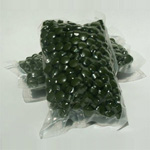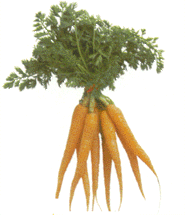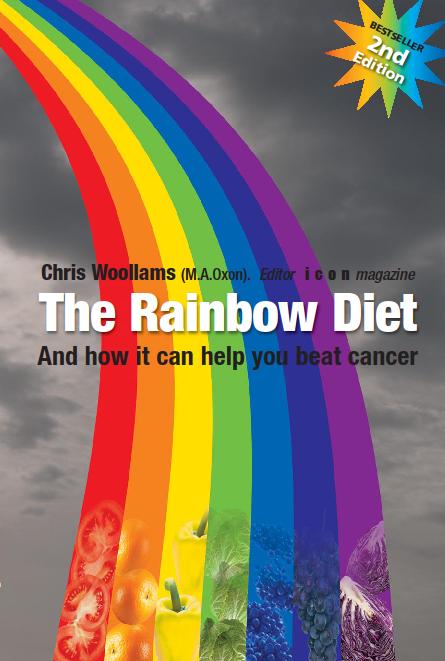
Beta-carotene occurs naturally in two forms (cis- and trans-) in a host of colourful fruits and vegetables. It is a powerful antioxidant. Carotenoids as natural compounds have been shown to have many anti-cancer benefits and to be able to beat cancer. However, question marks hang over the common High Street version of beta-carotene, which tends to be synthetic and only available in a single form. Frankly, it can be a poor copy of the real thing and research questions its benefits even suggesting it may do more harm than good. Caution is urged over its usage by smokers and people exposed to asbestos. A good natural alternative is Chlorella.

There are many antioxidants, for example lycopene in tomatoes, curcumin, and resveratrol in grape skins. Then there are regional agents like lemon grass; widely used in Thai cooking, it is 300 times more powerful than the beta-carotene in carrots! However, most commonly when people talk of antioxidants they tend to focus on three vitamin C, beta-carotene and vitamin E, (naming zinc and selenium as minerals that help).
In the US China study a five year research study involving over 170,000 people from 1988-93 the 38,000 people taling beta-carotene, vitamin E and selenium had 13 per cent less cancers and 21 per cent less deaths from cancer. If that isnt enough evidence of benefit, in the French 7-year SuViMax study ending in 2003 involving 17,000 people, those taking a combined antioxidant pill of vitamin E and C, beta-carotene, selenium and zinc saw a 31 per cent decline in male cancers and a 37 per cent decline in deaths.
These things help prevent cancer in the first place and they help you increase survival if you have it.
However, there have been reports of studies against vitamin E and beta-carotene, notably 2 mega-studies in 2003/4, which conclude that certain antioxidants could even harm yoiur health, putting you at a greater risk of cancer. However on detailed examination of these studies, we noticed that they had only chosen less than 20 studies out of 800 or more available and that those studies tended to use synthetic versions of the vitamins rather than natural versions.These synthetic versions usually also contain less variants than the natural vitamin (for example just one of the two forms of beta-carotene available in nature). As such, at CANCERactive, we see them as inferior copies, rather like a Thai copy of a Gucci handbag. Are you surprised when the handle breaks?
It is a very strong view of ours that NATURAL IS BETTER FOR YOU THAN SYNTHETIC. You will find that view evidenced and re-itterated throughout our web site and you will also find reviews of all the important supplements in this Nutritionals section.
Elsewhere you will find a complete review of Chlorella a green algae produced in Japan. This natural food is an excellent source of many natural vitamins, enzymes and minerals like Vitamin B-12 and beta-carotene. Indeed it has 300 times the concentration of beta-carotene that is in a carrot! If you want a natural source of beta-carotene we recommend you read the article on chlorella and if you are thinking of buying this product you may wish to see what ournaturalselection has to offer.
Beta-Carotene

Beta-carotene is a member of the Carotenoids family. In all there are over 500 members including, Iutein, cryptoxanthia, alpha-carotene, zeaxanthin and lycopene.
As a rule of thumb, carotenoids are found in dark green leaves and in bright orange, yellow and red vegetables. Only recently, Cancer Watch carried research that showed carotenoids were excellent at preventing the return of breast cancer.
Rather unsurprisingly, the name derives from the fact that they were first discovered in carrots.
Leaving aside Iycopene, (which we will deal with elsewhere on this web site and is found in tomatoes, tomatoes and tomatoes and a little in pink grapefruit), carotenoids are present in bright coloured peppers, apricots, carrots, greens, kale, spinach, broccoli, sweet potato, fennel and pumpkins. Consuming an excess of beta-carotene either in supplement or natural form, has been know to impart a yellowish tint to the skin!
Beta-carotene seems to have three actions:
It is an immune system booster
It can act as antioxidant
It can convert in the body to vitamin A, a proven anti-cancer agent
Beta-Carotene the Antioxidant
Every day the power stations in the cells produce waste by-products. Some of these are known as free radicals. The level of free radicals in the human body is worsened by factors such as "bad" fat consumption, alcohol consumption and smoking. Even exercise can also increase free radical levels.

Excess exercise can also increase free radical levels

A normal molecule has paired electrons, a free radical has a lone singleton looking to rip an electron off any molecule it passes - a cell membrane, an immune cell, even your DNA. Antioxidants neutralize free radicals preventing them doing harm. Beta-carotene is fat-soluble and like vitamin E protects cellular membranes.
Beta-Carotene and the Immune System
Many laboratories have linked free radicals to the anti-aging decline in the immune system. Dr Simm Meydani at Tufts studied the effects of 50 mg daily supplementation, showing that this produced much higher levels of natural killer cells than in normal adults.
Beta-Carotene and Vitamin A
There are a number of strong reports on the anti-cancer benefits of vitamin A. However vitamin A is toxic to the liver in large doses and it is better to increase levels of beta-carotene and let the body convert the required levels. Beta-carotene itself is non-toxic.
Beta-Carotene and Cancer Prevention
Care has to be taken when attributing anti-cancer benefits to beta-carotene, as it is the precursor of vitamin A, which has been known to inhibit cancers since the 1940s. Nevertheless there are over 200 studies showing positive benefit for beta-carotene in the fight against cancer.

There are over 200 studies showing positive benefit for beta-carotene in the fight against
cancer

A study which started in the 70s in Switzerland and lasted 12 years concluded that men with a lower blood level of carotenoids had a higher cancer mortality rate. This was particularly true for cancer where the difference was 60 per cent. Beta-carotene is known to have a particularly strong protective effect on epithelial tissues, e.g. the throat, intestines, lungs, colon and bladder.
In 1989 the University of Washington and the Fred Hutchinson Cancer Research Centre linked high beta-carotene intake with lowered cervical cancer rates.
Five thousand and four women in Britain had samples of blood frozen and over a number of years their health was monitored by St Barts. Beta-carotene levels were almost 50 per cent higher in women without cancer than in the ones who developed breast cancer.
Another study showed that 44 per cent of people with colon cancer who were given 30 mg daily supplements had cancer inhibition after just two weeks. And researchers in Arizona showed supplementation, also using 30 mgs per day for pre-cancerous mouth lesions (Ieukoplakia), caused total or partial regression in 71 per cent of tumours.
After clinical trials on prostate, cervical, colon, melanoma and breast cancers, the US Prostate Cancer Research Institute concluded there was "sufficient reason to supplement with beta-carotene."
Concerns?
Apart from the mega-study concerns above, there is some evidence that beta-carotene can cause some liver toxicity in people whose alcohol consumption is high. Then there are a couple of negative reports, where the sample studied were serious smokers, or exposed to asbestos.

Can cause some liver toxicity in people whose alcohol consumption is high

A Finnish study, reported in the Journal of the American Medical Association, followed male smokers over 5-8 years. Those taking beta-carotene supplements had an 18 per cent higher lung cancer rate. Another study, CARET, taking 18,000 women and men who smoked heavily or were exposed to asbestos showed an increased lung cancer rate of 28 per cent in the group that supplemented with beta-carotene/vitamin A.
In another study by Harvard University across 25 years and following 22,000 male physicians of ages between 40 and 84, those taking a supplement of 50 mgs per day gained neither benefit nor harm.
One conclusion drawn from this was that maybe the combined effect of a number of carotenoids was far more potent than taking a single one in a supplement.
Again, it must be repeated that most beta-carotenes in supplements are synthetic and feature only one molecule (all trans beta-carotene) whereas the natural state incorporates two molecules (all trans and 9-cis beta-carotene). This is why we recommend taking all natural Chlorella which is a pure, whole food.
It seems highly likely that beta-carotene as a supplement may work best in combination with other antioxidants. As previously mentioned with vitamin E it helps build the structure of membranes. Again, we recommend that you take a vitamin E from natural sources. It is essential, in our opinion, that the vitamin E contains all 4 tocopherols and also all 4 tocotrienols. You can find out more about the research into vitamin E and why you should take an all natural form with all 8 variants by clicking this Link. If you are thinking of buying natural vitamin E containing all 8 variants you may wish to see what ournaturalselection has to offer.
Supplementation
Beta-carotene is easily lost from the body and it should be taken as 3-5 mgs up to four times per day. Sometimes the packaging reports the dosage as International Units (lUs). 15 mgs is approximately 25,000 IUs.
However for our money, the very best way to get your beta-carotene is NATURALLY eat the foods or eat Chlorella, a great source of beta-carotene, and one of the worlds top versions is available in our online shop right now. We take it ourselves you might give it some thought!
The Chlorella at is a natural whole food full of vitamins, minerals, enzymes and Polysaccharides. We only select the best for our Products of Choice, so you can buy with confidence - and our Chlorella is the Internationally recognised Yaeyama variety, stringently prepared and specially wrapped in a three month supply for freshness.
 At Last - the definitive, research based book on how to build a diet to help beat cancer. Click here to read about it.
At Last - the definitive, research based book on how to build a diet to help beat cancer. Click here to read about it.
Please be clear: At CANCERactive we do not consider the above compound to be a cure for cancer, despite what the research says or experts doing the research may claim. The above, is an article on the compound from published research and expert opinion in the public domain. At CANCERactive we do not believe that any single compound (drug, vitamin, whatever) is a cure for cancer. We believe that people can significantly increase their personal odds of survival by building an Integrated Programme of treatments. Equally, cancer prevention is best practiced through a width of measures.